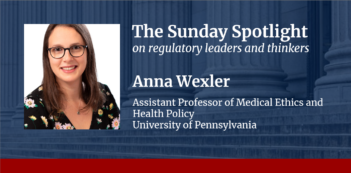
The Supreme Court upheld broad exemptions to employers’ reproductive health care coverage requirements.
A few weeks ago, the U.S. Supreme Court returned for the 2020 term. The Court is scheduled to grapple with privacy, free exercise, and criminal law—but thousands of workers are still grappling with a decision from last term that will have implications for workers seeking reproductive health care.
In Little Sisters of the Poor Saints Peter and Paul Home v. Pennsylvania, the Court upheld two rules providing employers with exemptions from the so-called contraceptive mandate. The contraceptive mandate flows from the text of the Affordable Care Act (ACA), which requires employers to provide employees with “minimum essential coverage.” For women employees, this includes “preventive care and screenings” with no cost sharing requirements.
After the ACA’s enactment, the federal government issued regulations to enforce its statutory requirements. These regulations called for the Health Resources and Services Administration (HRSA) to develop guidelines about what constitutes “recommended preventive services” for women. HRSA’s guidelines included contraceptive services—such as sterilization procedures, patient education, and counseling, in addition to contraception—as recommended preventive services.
Religious employers objected to these guidelines, arguing that the provision of contraceptive health care coverage would “impinge on their religious freedom.” In response to this concern, federal agencies created an accommodation to exempt religious employers from the contraceptive requirement. To take advantage of the exemption, organizations would have to self-certify to their health insurance issuers that they opposed contraceptive coverage due to religious beliefs.
But religious employers objected to this self-certification accommodation process, arguing that this process constituted a substantial burden under the Religious Freedom Restoration Act (RFRA). When religious employers challenged the accommodation, however, appellate courts around the country concluded that this process did not constitute a substantial burden.
In a 2016 decision, Zubik v. Burwell, the Supreme Court declined to weigh in on this substantial burden question, instead directing the agencies to better accommodate religious exercise. Furthermore, in Burwell v. Hobby Lobby, the Court held that the contraceptive mandate itself—absent the self-certification accommodation—violated RFRA as applied to closely-held, for-profit companies, because mandating the provision of contraceptive coverage without exception substantially burdened some employers’ religious exercise.
In 2017, the federal government issued new interim regulations in an attempt to “avoid the imposition” of a substantial burden under RFRA. The agencies determined it was “necessary and appropriate to provide the expanded exemptions,” allowing organizations to opt out of contraceptive coverage without participating in the self-certification process. The agencies provided a similarly broad exception for organizations with “moral convictions” opposing contraception. Both regulations made the self-certification accommodation optional. The agencies issued final versions of these regulations in 2018, which “left the exemptions largely intact.”
It was these 2018 final rules that came before the Court, and were ultimately upheld, in Little Sisters.
When the government finalized these expanded moral and religious exemptions, New Jersey and Pennsylvania objected, arguing first that the agencies lacked the statutory authority to issue the rules.
Writing for the majority, Justice Clarence Thomas cited the “plain language of the statute” to reject the states’ argument. He noted that the ACA “grants sweeping authority to HRSA” to determine the standards for implementing the preventive care requirement, rather than providing specifics about how HRSA should go about formulating coverage guidelines. “The same capacious grant of authority that empowers HRSA to make these determinations leaves its discretion equally unchecked in other areas,” Justice Thomas wrote, “including the ability to identify and create exemptions from its own guidelines.”
The Court also rejected the states’ argument that the agencies inappropriately relied on RFRA when deciding to broaden exemptions. Given the Court’s decisions in Hobby Lobby and Zubik, as well as Congress’s intent to protect religious liberty, Justice Thomas concluded that failing to discuss RFRA at all would have made the agencies’ rules “susceptible to claims that the rules were arbitrary and capricious for failing to consider an important aspect of the problem.”
Finally, the states argued that the final rules were procedurally invalid because the agencies failed to maintain an open mind throughout the rulemaking process. The U.S. Court of Appeals for the Third Circuit had agreed, noting that the interim rules and final rules were “virtually identical.” But the Supreme Court in Little Sisters rejected this “open-mindedness test,” referring to a prior decision in Vermont Yankee v. NRDC. In that earlier case, the Court prohibited lower courts from imposing extra requirements on agencies engaged in the rulemaking process, holding instead that the only procedural requirements agencies are bound by come from the Administrative Procedure Act. Rather than applying the open-mindedness test, the Court determined that the agencies complied with the Administrative Procedure Act, and therefore the rules were procedurally valid.
In a concurring opinion, Justice Elena Kagan agreed that HRSA had the statutory authority to create exemptions from the contraceptive coverage requirement, although she was unpersuaded by the majority’s rationale that the ACA’s plain text gave HRSA such authority. Instead, Justice Kagan relied on the Chevron doctrine to arrive at the same conclusion. Because the agencies themselves had concluded that the ACA allows them to create exemptions, Justice Kagan would “defer to that longstanding and reasonable interpretation” of the ACA.
Justice Kagan also questioned whether the exemptions could withstand a more thorough arbitrary and capricious analysis. She posited that the exemptions were overbroad, “raising doubts about whether the solution lacks a ‘rational connection’ to the problem described.”
Justice Ruth Bader Ginsburg dissented, contending that nowhere in the text of the ACA did Congress grant HRSA the authority to create exemptions from providing workers with contraceptive health care coverage. Furthermore, she concluded that the religious exemption cannot stand because when the government seeks to accommodate free exercise, “it may not benefit religious adherents at the expense of the rights of third parties.”
Justice Ginsburg focused her dissent on the approximately 126,000 employees who could lose access to no-cost contraceptive services as a result of this decision. She berated the majority for promoting religious rights over Congress’s intent to provide women with preventive health care. She also highlighted how contraception has health benefits besides solely preventing pregnancy because it “enables women to chart their own life’s course.”
Little Sisters means that these exemptions will go into effect, but states are likely to continue to challenge their implementation. Pennsylvania Attorney General Josh Shapiro, for example, issued a statement announcing his intent to continue challenging these “overly broad” regulations, and as Justice Kagan indicated, a future Court decision could find the rules to be arbitrary and capricious—all of which leaves the future of the contraceptive mandate uncertain.



